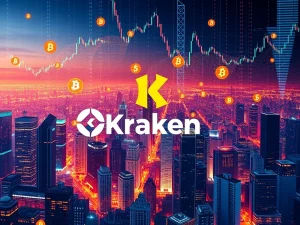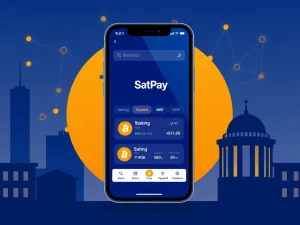Enterprise Adoption of Blockchain-as-a-Service: Changing Corporate Solutions
1 year ago MORIS
[ad_1]

Blockchain is no longer just for tech enthusiasts or cryptocurrency traders. It has found its way into the enterprise world. Today, large companies are exploring blockchain technology to improve their processes, boost transparency, and enhance security. However, building a blockchain system from scratch is complex and costly, which is why Blockchain-as-a-Service (BaaS) platforms are gaining popularity.
These platforms simplify blockchain integration for companies of all sizes, offering ready-made solutions tailored for corporate needs. In this blog, we’ll explore what blockchain for enterprises looks like, the role of BaaS platforms, and why enterprise-level DLT (Distributed Ledger Technology) adoption is accelerating.
What is Blockchain-as-a-Service (BaaS)?
Blockchain-as-a-Service (BaaS) is similar to Software-as-a-Service (SaaS), but specifically for blockchain. With BaaS, the enterprise is able to utilize blockchain technology without having to build and maintain its own blockchain infrastructure. A good BaaS platform will handle the backend-for example, security, infrastructures, and updates-while enterprises focus on using the technology.
BaaS enables any enterprise to integrate blockchain into their system with much ease. It avails them some of the key benefits accrued through blockchain, such as transparency, decentralized trust with security inbuilt, without having in-house expertise or significant upfront investments.
How BaaS Platforms Benefit Enterprises
BaaS platforms are essential in helping corporations adopt blockchain technology more efficiently. Here’s how they offer value:
Cost-Effective: Developing a custom blockchain solution from scratch can be extremely expensive. With BaaS platforms, businesses can save on infrastructure and development costs.
Scalability: BaaS platforms are designed to scale based on enterprise needs. Whether it’s a small project or a global operation, companies can adjust resources without overhauling their systems.
Simplified Deployment: BaaS platforms handle the technical details, like setting up nodes, managing security, and ensuring compliance. This frees enterprises to focus on business use cases rather than technical challenges.
Integration-Friendly: Many corporate blockchain solutions are designed to integrate with existing enterprise systems. This makes it easier to adopt blockchain without disrupting current processes.
Security and Compliance: BaaS providers offer built-in security features and often comply with global regulations, which ensures that businesses can use blockchain without worrying about vulnerabilities or legal issues.
Use Cases of Blockchain for Enterprises
Blockchain has a wide range of applications across different industries. Let’s take a closer look at how enterprise-level DLT is transforming various sectors:
Industry
Use Case
Benefits
Supply Chain
Tracking products from production to delivery
Increases transparency, reduces fraud, ensures quality
Healthcare
Storing patient records securely
Enhances privacy, improves data access for providers
Finance
Cross-border payments and fraud prevention
Reduces transaction time and cost, enhances security
Real Estate
Smart contracts for property transactions
Speeds up deals, reduces paperwork, increases trust
Retail
Loyalty programs using blockchain tokens
Improves customer engagement, increases efficiency
Key BaaS Platforms for Corporate Blockchain Solutions
Several major tech companies have launched BaaS platforms to meet the needs of enterprises. These platforms provide the infrastructure for companies to build and run blockchain applications. Here are some of the leading players:
Microsoft Azure Blockchain: Azure offers a BaaS solution that supports multiple blockchain frameworks. It’s known for its ease of use and integration with existing Azure services, making it a go-to option for enterprises that are already using Microsoft’s cloud platform.
IBM Blockchain Platform: IBM has positioned itself as a leader in enterprise blockchain. Their BaaS solution is powered by Hyperledger, a well-known blockchain framework for business use cases. IBM’s platform is highly customizable and used by industries like banking, healthcare, and logistics.
Amazon Managed Blockchain: Amazon’s BaaS solution allows enterprises to create and manage blockchain networks using Ethereum or Hyperledger Fabric. It’s particularly strong in scalability and integration with other Amazon Web Services (AWS) products.
Oracle Blockchain Cloud Service: Oracle’s blockchain solution is designed to support enterprise-grade use cases, offering features like data replication, transaction monitoring, and integration with Oracle’s other enterprise applications.
Challenges in Blockchain Integration
Despite the growing interest in blockchain, there are challenges that enterprises face when adopting this technology:
Complexity of Integration: While BaaS platforms simplify many aspects, integrating blockchain into legacy systems can still be complicated. Businesses need to ensure that new blockchain solutions do not disrupt existing operations.
Regulatory Uncertainty: Blockchain is still a relatively new technology, and the regulatory landscape is evolving. Companies need to stay updated on legal requirements in the regions where they operate.
Data Privacy: Blockchain’s transparency is one of its key benefits, but it can also raise privacy concerns. Enterprises must ensure that sensitive data is protected, even in a decentralized environment.
Interoperability: Different blockchain platforms may not always be compatible with one another. Enterprises need to choose their platforms carefully to avoid issues down the line.
Why Blockchain for Enterprises is Growing
The adoption of blockchain for enterprises is on the rise for several reasons:
Digital Transformation: More businesses are moving their processes online, and blockchain can enhance this transformation by providing better security and transparency.
Data Integrity and Security: Enterprises are increasingly concerned about data breaches. Blockchain’s decentralized nature makes it more secure, reducing the risk of hacking or unauthorized data access.
Regulatory Pressure: In some industries, such as finance and healthcare, regulations are pushing companies to adopt more transparent and auditable systems. Blockchain can help meet these demands by providing immutable records of transactions.
Efficiency and Cost Reduction: Blockchain technology can reduce the need for intermediaries in transactions, cutting costs and speeding up processes. This is particularly beneficial in industries like banking, where cross-border payments can take days to settle.
The Future of Enterprise-Level DLT
When it comes to the blockchain’s future in the enterprise sector – it looks promising. As technology advances, more industries will adopt enterprise-level DLT for improved security, transparency, and efficiency. BaaS platforms are bringing changes to businesses by offering scalable and secure solutions, letting companies focus on their goals. As regulations become clearer, adoption will accelerate, opening up endless possibilities for blockchain integration.
[ad_2]
Source link









